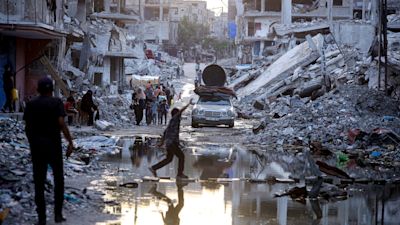October 7 kick-started the year depravity defeated diplomacy

Israel now finds itself fighting on several fronts, as ITV News' International Editor Emma Murphy reports
A year ago when the first reports of Hamas breaching Israel’s borders began to emerge the horror of what was underway and what was to follow was almost impossible to imagine.
The year since has been a litany of devastation. A dreadful example of depravity defeating diplomacy.
Of trauma, loss, death and displacement. Of multi-generational hatred being fuelled by the horrors of past and present with devastating impact for the future.
And now the region - and therefore the world - is on the precipice. Two powerful nations, Israel and Iran, appear to be adopting the fateful policy of escalate to de-escalate with the voices of reason or calm drowned out by the din of military bravado.
As Israel marks the anniversary of October 7 it does so as a nation at war on many fronts. In Gaza, in Lebanon and Iran. Less intense, but still with the potential for great harm, war too with the “Axis of Resistance” - fighters allied to Iran in Yemen, Iraq and Syria. And the West Bank is at a boiling point unseen for many years.
What Hamas did a year ago shook the very soul of Israel and any sense of security. The reaction of the Israeli government sought to offer a sense of strength and a determination to resecure borders and people. In reality, it has done neither. The threat to Israel is now even greater.
Overnight Hezbollah fired multiple rockets into residential areas in Haifa and Tiberias. The campaign of assassination against its leaders, the most damaging in its history, has not destroyed its power nor have the weeks of bombardment across Lebanon.
And as Israel remembers it does so beneath the shadow of a ballistic missile attack from Iran and the impending response. Though allied to Hamas, a year ago there is no evidence that Iran was seeking to escalate direct conflict with Israel. Now though both sides say they do not want war the reality is they have a limited one which teeters on the precipice of an all-out battle.
For a year there have been constant calls for deescalation. They have gone unheeded. All the while the death toll has risen, and Gaza and its people have been destroyed. Lebanon and its people fear the same fate.
Displacement has left millions without homes. Israel stands accused of war crimes by the International Criminal Court and the International Court of Justice is assessing a genocide claim. And all for all that, the hostages have not been released and the northern border is still under attack.
Now any hope of peace requires two ceasefires not one and the calls for Palestinian statehood are louder than ever. Without that, there seems little hope of any path forward.
America sought to counsel Israel about the dangers of a heated response in the days after the 7th. Their own reaction to 9/11 taught them, in theory, if not in practice, of the long-term risks of immediate and emotional responses.
Those words were not heeded and this region now is on the brink of a war that will define it and the world for generations.
In this year of diplomatic talk, one of the most honest statements was one of the most impromptu. At the UN a few weeks ago, Jordan’s foreign minister Ayman Safadi, expressed desperation at the situation.
Benjamin Netanyahu, he said, “is creating danger because he simply does not want the two-state solution. If he does not want the two-state solution, can you ask Israeli officials what is their end-game — other than just wars and wars and wars?”
Subscribe free to our weekly newsletter for exclusive and original coverage from ITV News. Direct to your inbox every Friday morning.
What is that end game is what’s causing the most concern globally now. The events of the past weeks suggest that Israel, high on their success against Hamas and Hezbollah, may have Iran in their sights. The risk of over-reach with horrendous global implications is now very real.
If violence could bring peace this region would have been in harmony for decades. Instead, it faces decades more violence and no peace.
There are many reasons to remember October the 7th and what came after, among them should be an acknowledgement of the victory of depravity over diplomacy.
Want a quick and expert briefing on the biggest news stories? Listen to our latest podcasts to find out What You Need To Know...